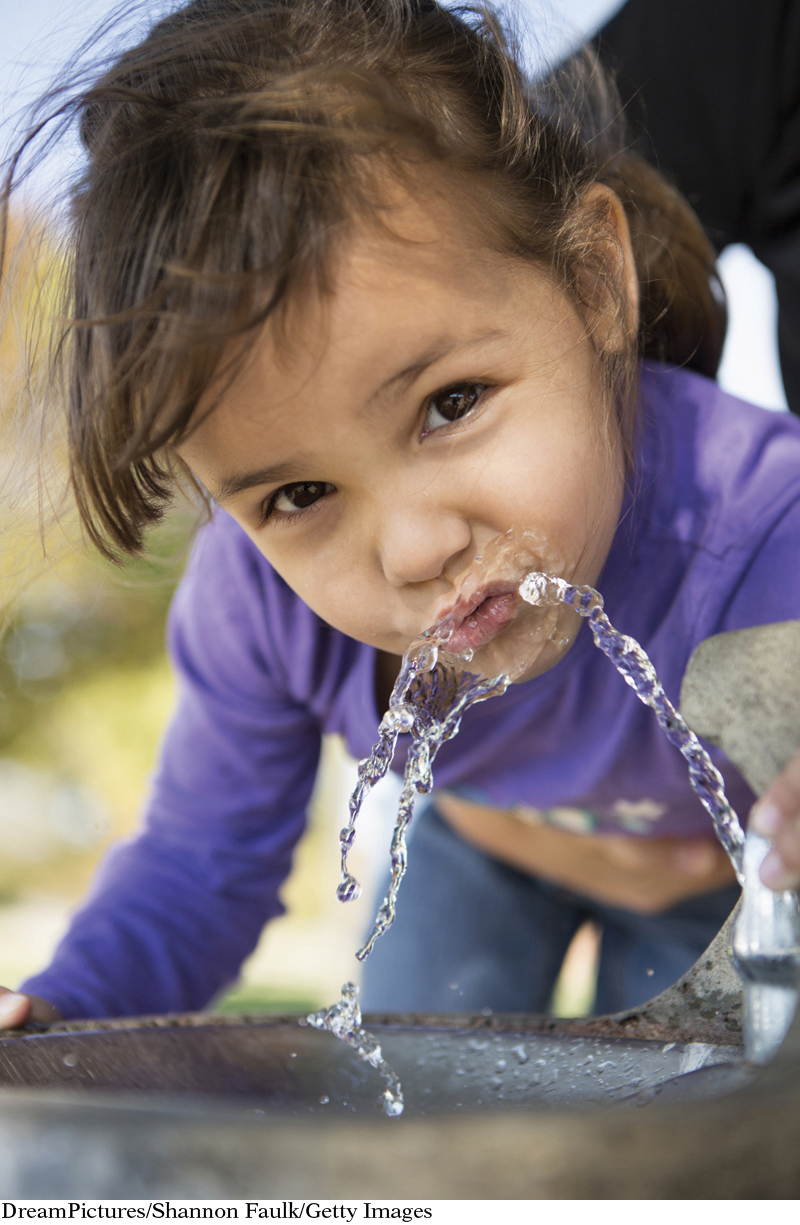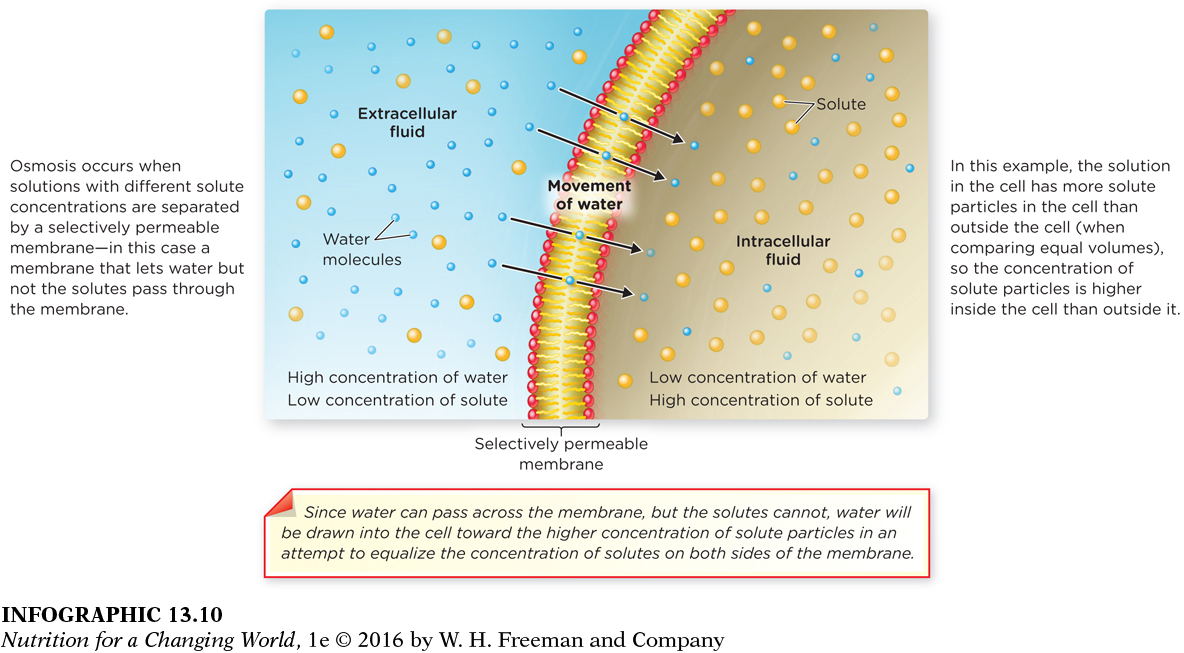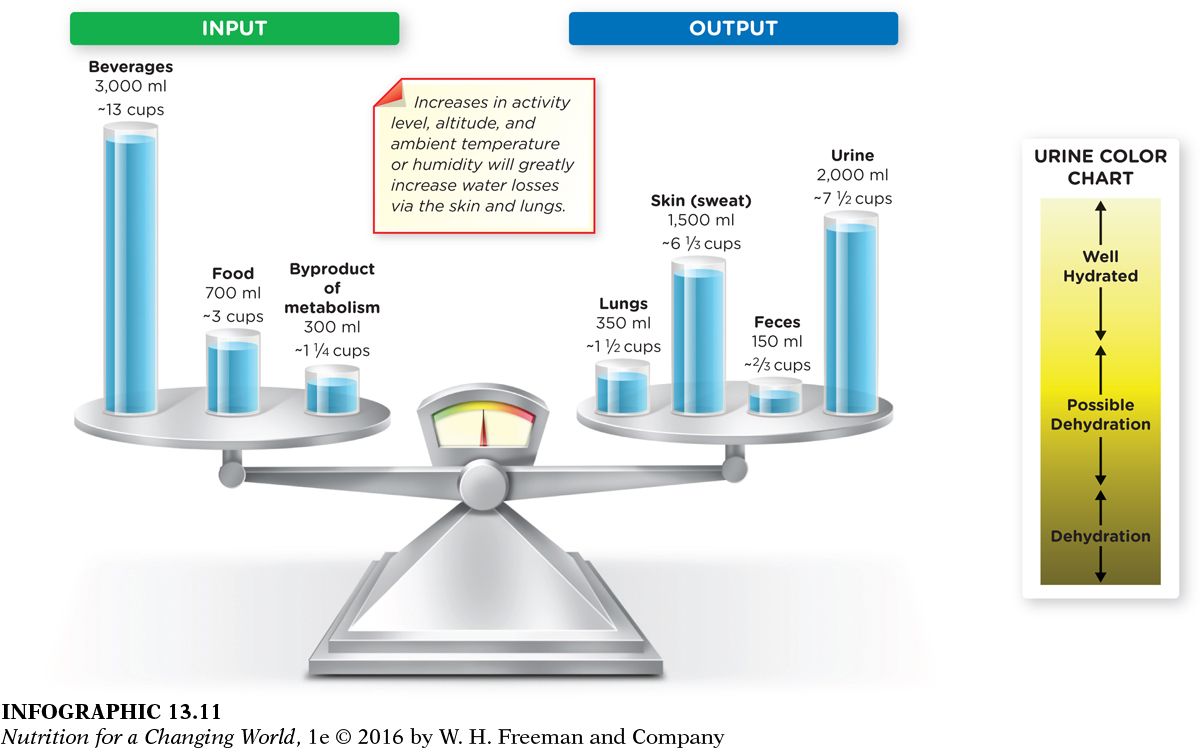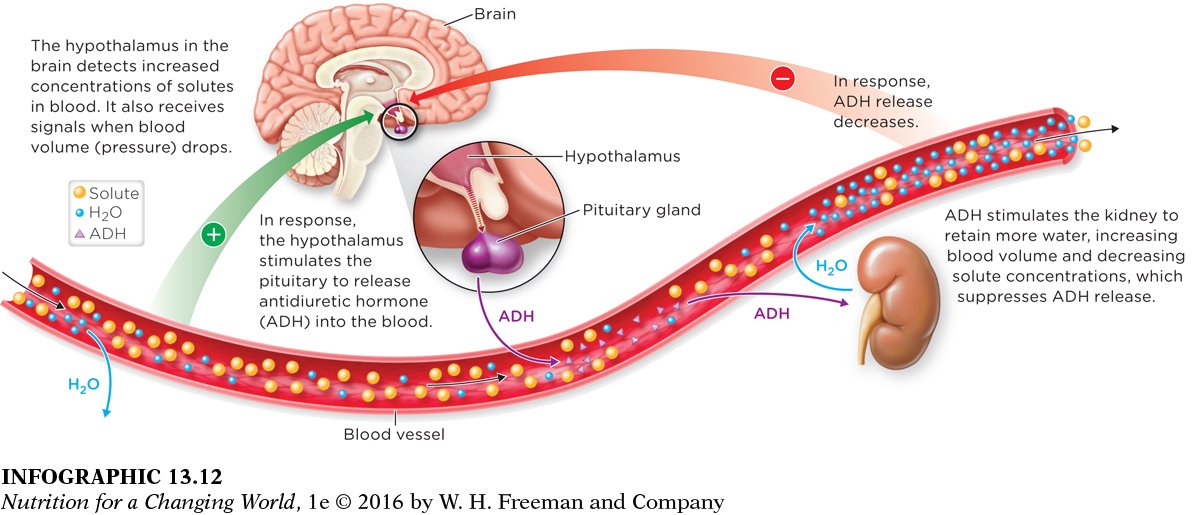WATER
The body maintains fluid balance by moving electrolytes to where more water is needed. However, the level of electrolytes in your body can become too low or too high. That can happen when the amount of water in your body changes, upsetting fluid balance and causing dehydration or even overhydration.

Approximately 60% to 70% of our bodies are made up of water, but the ratio of water to other substances in our tissues varies, depending primarily on the ratio of fat mass to lean body mass (body composition), which is strongly influenced by age and sex. The body of an adult man is approximately 60% water, and an adult woman is about 55% water—
Roles of water in the body
Water has many important roles in the body. It helps regulate body temperature within a very narrow range, which is important because even slight variations can affect body functions and damage organs. (Think about how a fever of 102°F—
299
Water transports nutrients and oxygen to tissues in your body. It is also present in the mucus and salivary juices of the digestive system, which help to move food through the digestive tract. Water also lubricates joints and mucous membranes in our noses, eyes, and the gastrointestinal tract. Since water can’t be compressed, it helps to protect delicate tissues like the brain, eyes, and spinal cord against injury and shock.
SOLVENT a liquid substance that is capable of dissolving another substance
Water acts as a solvent—a liquid substance that is capable of dissolving another substance, and participates in the body’s biochemical reactions. For instance, without water our bodies can’t break down proteins, carbohydrates, or fats to extract energy. Water also helps to remove waste from the body via urination, perspiration, and bowel movements.
Water balance in the body
OSMOSIS a process by which water passes between intracellular and extracellular spaces (or compartments) through cellular membranes
SOLUTE a dissolved substance
Approximately two-

Question 13.5
 As water moves into the cell what will happen to the size of the cell?
As water moves into the cell what will happen to the size of the cell?
The cell increases in size (swells) as water moves in.
300
In the case of our marathoner, as he was rapidly drinking the low-
RESPIRATION the process of transporting oxygen from the air to the cells within tissues (inhalation) and transporting carbon dioxide from cells to the air (exhalation)
One of the reasons we need to drink fluids is because we lose water throughout the day and our bodies can’t store extra to fill the void. But how much water we need to drink depends on many factors. We lose, on average, about 350 ml, or 11⁄2 cups, of water each day through respiration, the process of transporting oxygen from the air to the cells within tissues (inhalation) and, conversely, transporting carbon dioxide to the air (exhalation). When we breathe, water evaporates from the lungs and the skin. How much water we lose while respiring depends on the air temperature and our body temperature, how active we are, how humid the air is, and how big our bodies are. The more we respire—

Question 13.6
 If someone increases their fluid intake without increasing physical activity, through what route would this excess fluid be lost?
If someone increases their fluid intake without increasing physical activity, through what route would this excess fluid be lost?
An increase in fluid intake, not accompanied by an increase in activity, would be lost through urination.
We lose 140 ml to 150 ml of water, or about two-
301
Our water needs can fluctuate because of other factors, as well. We need more water when we are ill, because we respire more with a fever, and our body perspires to cool itself; vomiting also increases water loss. We also need more water when we eat high-
The body achieves water balance by attempting to ensure that the amount of water we consume in food and drinks and the amount we produce through metabolism equals the amount of water we excrete. We can thank our kidneys and our brain for achieving this balance. The kidneys conserve water by reducing urine volume when necessary, and they excrete excess water by increasing the volume of urine and making it more dilute when we have excess fluid.
ANTIDIURETIC HORMONE (ADH) a peptide hormone produced by the hypothalamus, with the primary function of decreasing the amount of water excreted by the kidneys; stored and released in the posterior pituitary gland
When the concentration of solutes in the blood increases, or when blood volume drops, the brain responds by stimulating the pituitary to release antidiuretic hormone (ADH). ADH tells the kidneys to conserve water to bring more water back into the bloodstream, which will also lower the concentration of solutes. When the brain detects that water volume has increased again, it decreases the production of ADH so that the kidneys stop conserving water. Without ADH, urine becomes very dilute. (INFOGRAPHIC 13.12)

Question 13.7
 Why will intense exercise stimulate ADH secretion?
Why will intense exercise stimulate ADH secretion?
Water needs increase when we exercise vigorously. ADH is released so that ample water is retained in the bloodstream.
Thirst is typically a powerful and rapid barometer that tells us when we need to drink (and conversely, lack of thirst tells us we don’t need to drink). The same factors (an increase in solutes in the blood or a drop in blood volume) that stimulate the release of ADH also stimulate the brain to generate the sensation of thirst. So, in the end, ADH and thirst work in concert to increase body fluids and decrease the concentration of solutes in blood. However, in those over the age of 65, the thirst sensation is diminished when they become dehydrated or experience increased solute concentrations in blood, which slows the restoration of fluid balance.